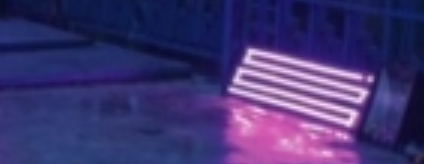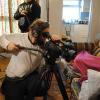Search the Community
Showing results for tags 'technology'.
-
As we all know, ai technology is changing our daily life now when it was generally spread and used by people all around the world in the very beginning of 2023. Some people even start to worry about whether their jobs will be replaced by ai in the future or not. As for me, a young cinematographer, I've been thinking this question a lot of times. It is interesting to listen to ChatGPT-4 and let's look how does it answer this question as below: As a cinematographer, embracing AI technology like ChatGPT and Midjourney can greatly enhance your creative process and workflow. Here are some ways to confront and integrate AI tools into your profession: Creative collaboration: Use AI tools to generate ideas, prompts, or even develop storyboards. These tools can provide you with fresh perspectives or unique concepts that you might not have considered before. Pre-visualization: AI can help you visualize scenes or locations before shooting. With tools like Midjourney, you can create concept art or mood boards to better understand the desired look and feel of your project. Time and resource management: AI tools can help you optimize your shooting schedule and resources, making your production more efficient. Learning and development: AI technology is continually evolving, and staying updated with the latest advancements can help you understand and adapt to new techniques, tools, and trends in the industry. Enhance communication: AI tools can help bridge the gap between different departments in a film production. For example, they can facilitate communication between cinematographers, directors, and other crew members by creating visual references or translating ideas into a visual format. Post-production: AI tools can assist with tasks like color grading, visual effects, or even editing, saving you time and effort during the post-production process. Adapt and evolve: Embrace AI technology as a tool to complement your skills and expertise rather than viewing it as a threat. AI can augment your creative process but cannot replace the artistic vision and intuition of a human cinematographer. In summary, confronting AI technology in cinematography involves integrating these tools to enhance and streamline your creative process, stay updated with industry advancements, and optimize production efficiency. Embrace AI as a valuable resource that complements your skills and experiences, allowing you to create visually stunning and impactful projects. What I write above is only for reference. I'm happy to talk about this with you guys!
-
Kindly ignore if the topic is irrelevant. As a student of cinema and cinematography,what I have noticed the advancement in tech is more of a concern in cinematography rather than the aesthetics or in some case, story. Films like Nope or TV series shot in virtual production,or something like Way of Water . Hence I wanted to ask in what way we are going to see evolution of Cinematography in next decade or two ,and should we still study films by Freddie Young,Vittorio Storaro ,Frederick Elms, Chris Doyle,Bruno Delbonnel,Claire Mathon etc. where the aesthetics is still kept under consideration? Also the people who are starting out in cinematography ,would need to add some more skill set under the belt ? Thanks in advance. Saikat C Cinematographer | Colorist
- 32 replies
-
- cinematograhy
- technology
-
(and 1 more)
Tagged with:
-
I'm a DP working out of Central America and most of my work is high-end commercials in the region. I do some eventual documentaries, music videos, short films, etc, but my bread and butter is commercial work. So far, I've been renting gear out and mostly shooting on Arri Alexa Plus and RED Epic MX. I do not own any important personal gear. There are a couple of jobs coming up and I have the opportunity to invest about $20k on a camera package. 50% of the investment would be paid off within the next 2-3 months. So far, I've been thinking about purchasing a used Arri AMIRA. I like the fact that you can shoot 3.4k RAW, am a huge fan of ARRI's color science and the sensor's dynamic range. My main concern is that this camera was released six years ago and sensor technology is quickly evolving. I've also been looking at the new Sony FX9 as an option or even spending a little more money and going for a RED GEMINI (just because of native resolution and trying to future proof the investment). My gut keeps telling to go with the AMIRA, but I would really like to hear other opinions and ideas! Thanks.
- 104 replies
-
- 1
-

-
LOS ANGELES (August 15, 2016) - The 38th edition of The Reel Thing, a three-day symposium addressing audio/visual restoration and archiving, will explore the constantly evolving ecosystem of film and digital restoration and preservation. This year's program will examine legacy film restorations and showcase modern technologies being used to futureproof collections and keep them viable for future display and distribution formats. The event will take place August 18-20 at the Academy's Linwood Dunn Theater in Hollywood. In addition to discussions with industry leaders, premiere screenings of several restored films are scheduled, including the original, uncensored version of John Huston's BEAT THE DEVIL; Marlon Brando's single directorial project ONE-EYED JACKS; and Robert Altman's MCCABE AND MRS. MILLER. Created and co-founded by Grover Crisp, executive vice president of asset management for Sony Pictures, and Michael Friend, director of digital archives and asset management at Sony Pictures, the event supports the programs and services of the Association of Moving Image Archivists (AMIA). "At The Reel Thing, our presenters continue to demonstrate the recovery of the achievements of the first century of cinema even as we assess the challenges presented by the first decades of digital moving image culture," says Friend. "Ever-more effective tools are being devised to address the mechanical and optical challenges of film restoration, and significant new technologies for the long-term preservation of digital data are rapidly evolving. At the center of this activity, technicians, archivists and the rest of the subjective human audience for cinema continue to examine, refine and redefine our understanding of the notion of preservation for both analog and digital moving image art." "It is an exciting time for the archival community as we address the changing technologies that help to preserve collections and our cultural heritage, whether it is film, audio, video or any flavor of digital you choose," notes Crisp. "Our audience is interested in the problems and potential solutions surrounding how we can cope with the issues we encounter in this still hybrid analog/digital landscape we find ourselves in." Presentations at The Reel Thing will feature expert-guided discussions on such topics as UHD/HDR, scanning, color correction, frame rate adjustment, color space and gamut. Case studies on the approach to preserving legacy films in higher quality standards and the processes applied will highlight several panels. Audio restoration will also be explored, looking at the latest technologies in sound. Speakers are expected to include: Michael Pogorzelski, Academy Film Archive; John Polito, Audio Mechanics; David Marriott, Lynette Duensing and Craig Rogers, Cinelicious; Lee Kline and Ryan Hullings, The Criterion Collection; Chris Reynolds, Deluxe Entertainment Services Group; Steve Kochak, Digital Preservation Laboratories, Inc; Wojtek Janio, Fixafilm; Andrew Oran, FotoKem; Gilles Barberis, L'Immagine Ritrovata; and Snowden Becker, UCLA, among others. For more information and to register for The Reel Thing, go to www.the-reel-thing.org. The symposium offers several registration options, as well as discounts for certain industry groups and students.
-
- The Reel Thing
- preservation
- (and 8 more)
-
Odd request, but here goes: An upcoming script calls for the ability to record at least half-decent looking 720p at 24p for...3 hours straight, no cuts. One locked-off shot down a beach (powering everything is another question entirely) that has to just roll for 3 hours. This is not for timelapse: It needs to actually roll 24p for three hours continuously. What sort of camera (plus external recorder, potentially) system might you aficionados recommend for a task like this one? I have a 7D at my disposal, but I figure that won't do me much good. Probably looking at something with at least SDI out, wonder if there's a way to go direct to some spinning disk array or something... It's basically gonna be a parody of those YouTube videos that are just stock footage, like "3 Hours Tranquil Beach Waterfall Blue Skies," but in a dark demented sort of way. Thanks for trying! -Rob
- 4 replies
-
- Camera
- Technology
- (and 4 more)
-
Hi there, I am currently creating a research project for my final piece at university on the evolution of the cinema camera and how cinematographers deal with the ever changing technology. In particular the transition from 35mm celluloid to digital. I am looking for people who have worked with film stock and digital and wish to answer a set of questions I have prepared. The questions below have been sent out to various D.O.P's and also camera companies such as Arri, RED and Panasonic. During your time in the film industry, what do you believe to be the main changes in the technology used, especially in regards to the shift from celluloid to digital? What do you think the benefits are of digital cameras? Do you feel celluloid is dead? If so, do you feel moving away from celluloid is a good idea? If not, then why do you think this? What do you prefer yourself, celluloid or digital? Please explain your as detailed as possible. When you started out in the industry what camera were you using? How does this compare to what you are using now? Do you feel the digital age of cameras has opened the door to younger filmmakers due to the technology being cheaper? On top of asking D.O.P's themselves, I also want to open these questions up to various forums and find out what the community thinks in regards to celluloid vs digital. If any of you would like to answer the questions above (you dont need to answer all of them if you dont want to) then that would be brilliant and I would be very grateful. Also, if any of you have any other points that you wish to make in regards to the evolution of the cinema camera then please feel free to comment. Thank you for your time. Alun.


.thumb.jpg.b9230c4c48f1e9b0be6df67d3b72d422.jpg)

